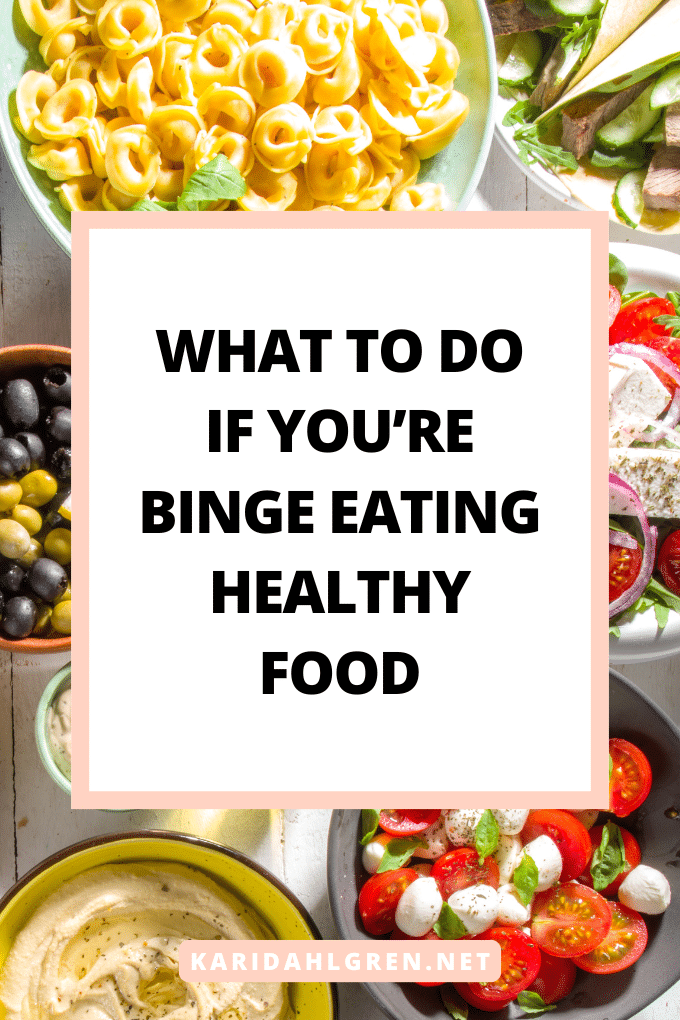
Have you ever caught yourself binge eating healthy foods, feeling just as out of control as you would with junk food? Binge eating isn’t limited to certain types of food, and if you struggle with binge eating healthy options, you’re not alone. There are deeper reasons why this happens.
Binge eating isn’t just limited to sugary snacks or fast food—it can happen with healthy foods too, and it can feel just as overwhelming. It might even be more frustrating than binge eating “unhealthy” food because the intentions are pure, yet the loss of control still leaves you feeling powerless and confused.
This article will explore evidence-based reasons for binge eating healthy food and what sets it apart from overeating. By understanding these dynamics, you’ll gain the tools to find balance and restore a healthy relationship with all foods, not just the ones labeled “good.”
What Is Binge Eating?
To understand what leads to binge eating healthy food, it’s important to understand the difference between binge eating and overeating, as the two involve very different behaviors and psychological impacts.
According to the Diagnostic and Statistical Manual of Mental Disorders (DSM-5), binge eating disorder involves the following criteria:[1]
Recurrent episodes of binge eating, characterized by:
- Eating a significantly larger amount of food than most would under similar circumstances within a set period (e.g., any 2-hour period).
- Experiencing a lack of control over eating during these episodes.
Binge-eating episodes include three (or more) of the following behaviors:
- Eating much more rapidly than normal.
- Eating until feeling uncomfortably full.
- Eating large amounts of food when not feeling physically hungry.
- Eating alone due to embarrassment about the quantity of food consumed.
- Feeling disgusted, depressed, or very guilty afterward.
Marked distress regarding binge eating is evident.
Frequency of binge eating is at least 1 day a week for 3 months.
The binge eating is not associated with compensatory behaviors (e.g., purging, fasting, excessive exercise) and is not exclusive to other eating disorders like anorexia or bulimia.
Overeating may also feel uncomfortable, but it does not involve the same level of distress or loss of control. Overeating can happen at social gatherings or during celebratory meals but lacks the compulsive nature, regularity, and emotional aftermath typical of binge eating episodes.
Binge Eating “Healthy” vs. “Unhealthy” Foods
Studies have shown that ultra-processed foods, which are often high in sugar and/or fat, are often linked to binge eating behaviors. According to a 2021 study published in Nutrition, 100% of the foods consumed during binge episodes in clinical samples were ultra-processed.[2]
While many associate binge eating with unhealthy food, a study published in Nutrients found that individuals with binge eating disorder often consume staple foods like rice and beans during their episodes, particularly in middle-income countries like Brazil.[3]
This insight reveals that binge eating is not just about unhealthy snacks but can involve regular meals, which challenges the common assumption that only “junk food” leads to binges.
What Causes Binge Eating Healthy Food?
Understanding the causes behind binge eating healthy food can help you better understand why, even with the best intentions, eating habits sometimes spiral out of control.
It’s easy to assume that binge eating only happens with processed food, but when you’re focused on maintaining a healthy diet, you might still find yourself overeating nutritious options. This can be confusing and frustrating, especially if you’ve internalized the idea that eating healthy should naturally lead to self-control.
Here are 10 common reasons for binge eating healthy food:
The “Good Food” Mentality
Viewing food through a moral lens, where certain foods are deemed “good” and others “bad,” can lead to binge eating healthy options. A study published in Frontiers in Nutrition found that both individuals with eating disorders and the general population tend to associate food with moral attributes, especially based on calorie content.[4] This moralization of food can cause people to overconsume healthy items as a way to avoid the perceived guilt of eating “bad” foods.
Orthorexia
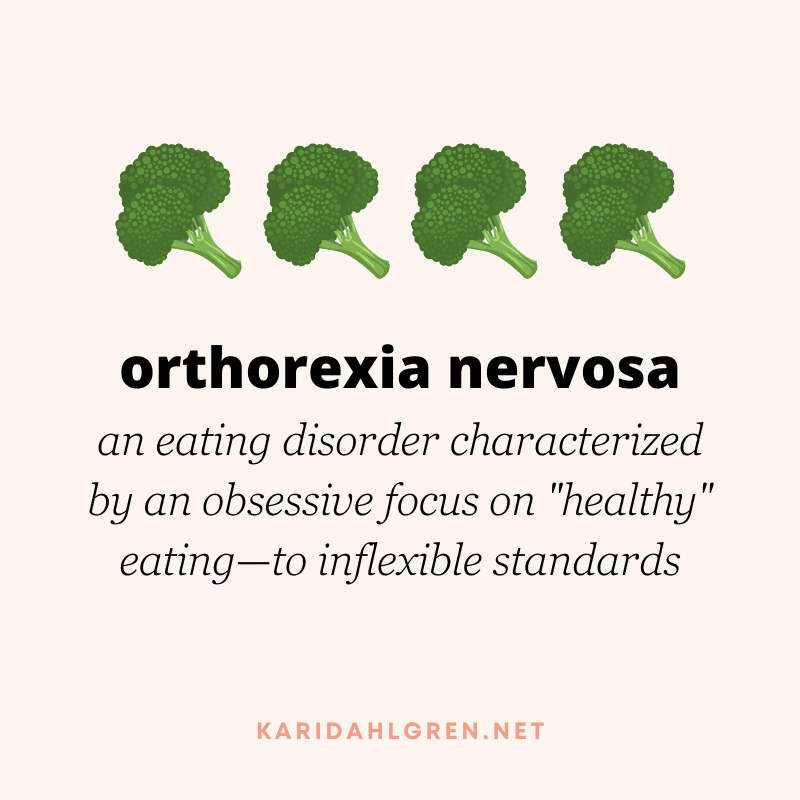
Orthorexia nervosa is an eating disorder characterized by an obsessive focus on “healthy” eating—to inflexible standards.[5] A study in the Journal of Clinical Medicine noted that orthorexia shares traits with both eating disorders and obsessive-compulsive disorder, highlighting its compulsive and rigid nature.[6] This preoccupation with “pure” eating can sometimes lead to binge episodes on healthy foods when the pressure to maintain strict dietary standards becomes overwhelming.
Perfectionism
A study in the Journal of Eating Disorders found that perfectionistic concerns are linked to binge eating, as individuals feel compelled to maintain strict control over their eating.[7] If someone with perfectionistic tendencies has internalized the idea of food morality, they may feel compelled to rigidly adhere to “clean” eating, which can backfire and trigger binge eating on healthy foods when their strict standards become unsustainable.
Restriction
Restricting unhealthy foods can set off a cycle of deprivation and overeating, even when you’re focusing on healthy options. According to a study published in Frontiers in Nutrition, restrained eaters are particularly prone to overeating, often consuming more food than unrestrained eaters when their diets are disrupted.[8] This is the premise behind the restrict-binge cycle, where the initial restriction leads to later overeating.
Environment
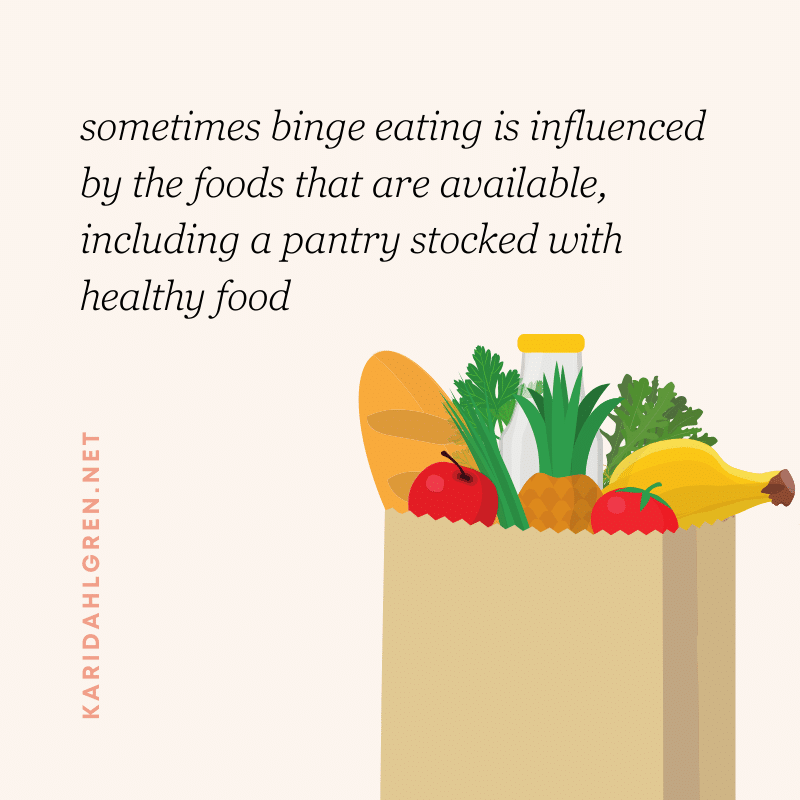
The restrict-binge cycle is often reinforced by one’s environment. For instance, a common approach to sticking with a restrictive diet is to eliminate all processed foods from the house to reduce temptation. However, binge eating is a deeply ingrained issue that goes beyond just removing certain foods. When only healthy options are available, the cycle of restriction can still lead to binge eating, as accessibility alone doesn’t address the underlying emotional or psychological triggers.
Negative Emotions
Emotional distress can trigger binge eating, even on healthy foods. According to a study in The International Journal of Eating Disorders, negative affect increases before and decreases after a binge, especially in those with bulimia nervosa.[9] Emotional turmoil often drives this behavior, regardless of the type of food consumed.
Positive Emotions
While binge eating is often associated with negative emotions, positive emotions can also trigger overeating. That said, the outcomes are generally better. A study published in Appetite found that people who engage in emotional eating when feeling happy experience different psychological outcomes compared to those who eat in response to negative emotions.[10]
Stress
Chronic stress can lead to overeating, particularly in individuals practicing dietary restraint, which refers to the intentional restriction of food intake, usually to control body weight. According to research published in the Journal of Psychosomatic Research, those who engage in restrained eating are more likely to increase their food intake during high-stress periods compared to unrestrained eaters.[11]
Boredom
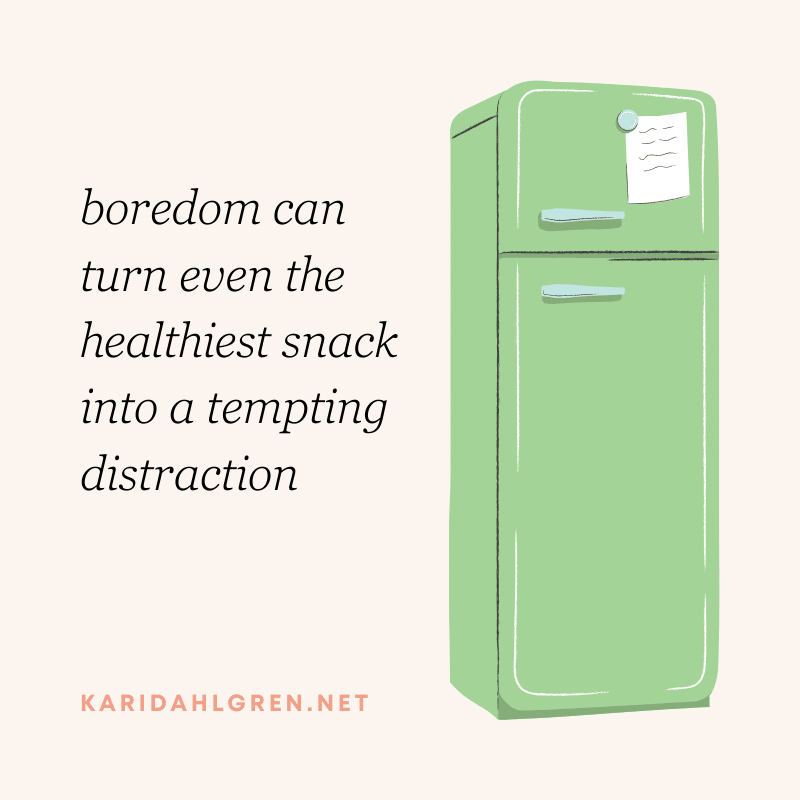
According to a study published in Frontiers in Psychology, boredom can significantly influence eating behavior by prompting individuals to consume food as a way to escape self-awareness.[12] When bored, people may turn to both unhealthy and exciting healthy foods, using food to distract from the feeling of purposelessness that boredom induces. When food becomes a tool to avoid the discomfort of boredom, it can manifest as binge eating in an attempt to create stimulation or meaning.
Reward Responses
An imbalance between reward and self-regulation processes can contribute to binge eating, according to research summarized in Physiology & Behavior.[13] When food is perceived as more rewarding, especially in a context of deprivation, it can lead to overeating even healthy options.
While hyperpalatable foods—those high in fat, salt, and sugar—are often seen as the most rewarding, healthy foods can also trigger similar feelings of reward depending on their taste and a person’s internalized beliefs about what constitutes “good” or “bad” food.
How to Break the Cycle of Binge Eating Healthy Food and Find Balance
It’s easy to think that focusing on “healthy” options should naturally lead to balance, but when you’re caught in a pattern of restriction and overconsumption, even nutritious foods can become part of the problem. Finding balance means understanding the underlying triggers and learning practical strategies that help you enjoy food without the guilt or compulsion.
Here are some steps you can take to gradually overcome binge eating patterns with healthy food:
1. Deprogram the Moralization of Food
To break the cycle of binge eating healthy food, it’s essential to drop the moralization of food. When you label certain foods as “good” or “bad,” it can create an unhealthy dynamic where any deviation from “healthy” eating leads to guilt and, eventually, overeating.
By removing these moral labels and embracing food neutrality, you allow yourself to approach food with more freedom and less anxiety. This shift helps reduce the pressure to eat “perfectly,” which often triggers binge eating as a way to rebel against self-imposed restrictions. When you stop viewing food in extremes, you can make more balanced, satisfying choices without feeling compelled to overeat—even when the food is healthy.
2. Practice Intuitive Eating
Intuitive eating is a style of eating that involves eating when you’re hungry, making food choices based on health as well as enjoyment, and stopping when you’re full. By honoring your hunger, you prevent the build-up of deprivation, which often triggers overeating. Satisfaction also plays a crucial role here—when you eat foods that truly satisfy both your body and mind, you’re less likely to overeat in search of fulfillment.
If the fear of weight gain is holding you back from trying intuitive eating, you’re not alone. It’s one of the most common hurdles when letting go of dieting, but it’s also a concern you can work through.

Clinical evidence supports intuitive eating, demonstrating that it leads to greater weight stability than dieting, better eating habits, and improved psychological well-being.[14] Intuitive eater also tend to eat more fruits and vegetables than dieter[15]—not because that’s the goal, but because that’s what naturally happens when you listen to internal body cues instead of battling with external food rules.
3. Focus on Satisfaction
Eating should be about more than just fueling your body—it should be enjoyable. One key way to break the binge cycle is to focus on satisfaction, both physically and emotionally. Slowing down during meals, savoring each bite, and truly enjoying the experience of eating can curb the tendency to overeat, even if the food is considered “healthy.” When meals are satisfying on multiple levels, the urge to continue eating lessens, as you feel content with what you’ve consumed.
4. Address Emotional Eating
Binge eating, even on healthy food, often stems from emotional triggers like stress, boredom, or unresolved feelings. Developing tools to cope with these emotions without turning to food is critical. My Stop, Drop, & Feel® method is a helpful practice here:
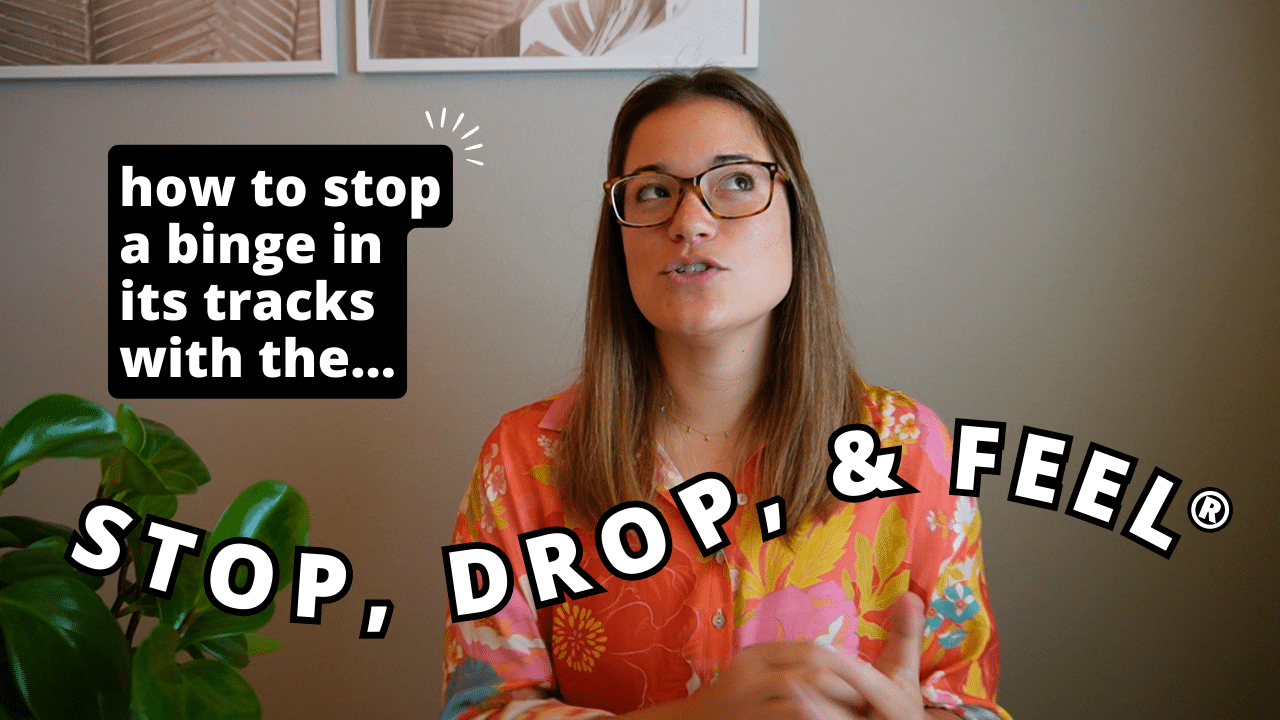
It works by encouraging you to pause before eating when you aren’t hungry and drop into your emotions. If an uncomfortable emotion surfaces, practice holding space for it without resisting it. This practice helps promote emotional tolerance, the ability to withstand discomfort without resorting to compulsion, which is associated with reduced loss-of-control eating.[16]
5. Promote Balance and Flexibility
Balance and flexibility are key components of a healthy relationship with food. It’s important to recognize that not every meal needs to be ideal or perfect. Sometimes life circumstances—whether it’s time, resources, or energy—won’t allow for the most satisfying meal, and that’s okay.
Flexibility means understanding that it’s about the bigger picture, not just individual meals. Encouraging a balance between physical and emotional satisfaction can help you move away from the all-or-nothing mindset and accept that perfection is not the goal.
Overcoming Binge Eating
Overcoming binge eating on any type of food, whether it’s a kale salad or a bag of chips, starts with understanding that it’s not about the food itself—it’s about our relationship with it. When we moralize food or place unrealistic expectations on ourselves, we create a cycle of restriction and guilt that inevitably leads to feeling out of control. By shifting our mindset to embrace food neutrality, listening to our bodies, and building emotional resilience, we can break this cycle.




Thank you so much for all your really helpful emails, I feel like you are the only person who speaks to me! I am not considered overweight in general but I am for me, and I am tte above, I only eat healthy foods but yes often compulsively.
I struggle with the concept of intuitive eating and the stop drop and feel, but I’m working on it!
Thanks so much for understanding that food issues are not all the same!
I am so happy my content resonates with you, Katie! And I can absolutely understand how intuitive eating and even the SDF are hard to put into practice. Letting go of food rules brings up all kinds of anxiety, which just piles on top of the emotions we’re already trying to deal with! I can speak for myself at least 🙂 My hope is that, by making the “goal” with the SDF just two minutes a day, it feels accessible enough to do, even if it’s a slog. Two minutes can feel like forever when you’re trying to sit still with edginess. So, kudos to you for working on it! Keep in touch and let me know how things progress. I am truly curious to hear more in the near future!